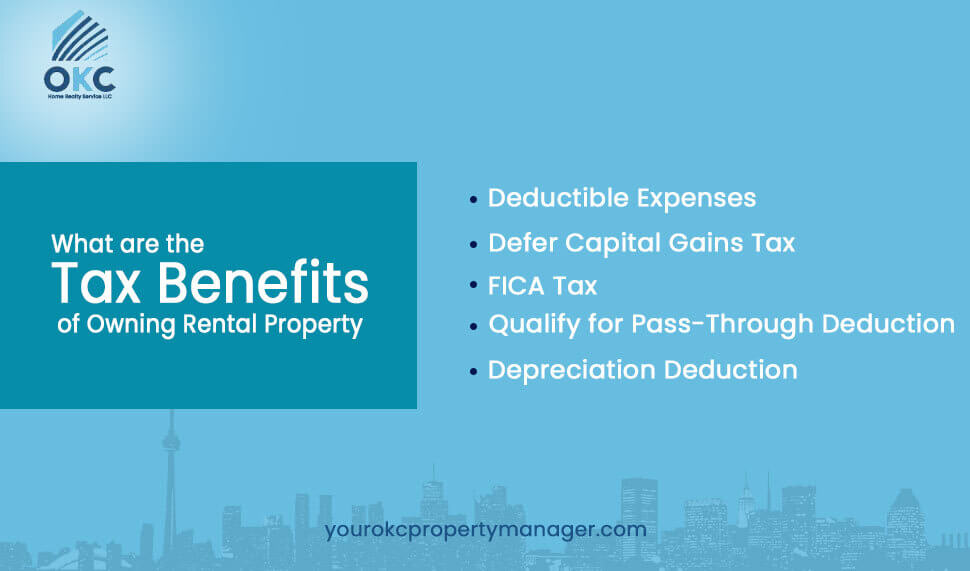Owning a rental property can provide a good source of income and help increase property owners’ equity, as well as several tax benefits. However, many landlords miss out on thousands of dollars in tax savings simply because they don’t know about the deductions and incentives available. Understanding and utilizing tax benefits can significantly enhance the profitability of your rental property investments. For instance, being aware of Oklahoma’s property tax rate is crucial, as it directly impacts your annual rental expenses and potential tax deductions.
As a real estate investor and property manager in OKC, I have over 20+ years of experience helping numerous landlords optimize their tax strategies, saving them significant money each year. In this blog, I’ll talk about the various rental property tax benefits and how you can make the most of them.
Maximize Your Rental Income with Hassle-Free Property Management
Request a Service →Top Tax Benefits of Owning Rental Property in Oklahoma
Here are some tax advantages of owning a rental property:
- Deductible Expenses
- Defer Capital Gains Tax
- FICA Tax
- Qualify for Pass-Through Deduction
- Depreciation Deduction

Deductible Expenses
One of the key advantages of owning a rental property is the ability to deduct certain expenses from your taxable income. These deductible rental expenses can help lower your overall tax liability and increase your cash flow. Here are some common deductible expenses for rental property owners:
- Deductible Operating expense: Operating expenses encompass costs incurred in managing and maintaining a rental property. According to IRS, ordinary and necessary expenses include Advertising costs, leasing commissions, property management fees, repairs and maintenance, pest control, landscaping, supplies, utilities paid directly by the landlord, etc.
- Deductible Mortgage interest: Mortgage interest is fully tax-deductible since it is paid on the loan which is used to purchase a rental property. This deduction applies to both primary and secondary residences. By deducting the interest payments, you can reduce your taxable rental income, which lowers your tax liability.
- Property Tax Deduction: The property taxes paid on your rental property are also tax-deductible. You can deduct the full amount of property taxes paid during the tax year, further reducing your taxable income. It is important to keep track of these payments and ensure that they are accurately reported on your tax return.
- Insurance Premiums: The insurance premiums you pay for your rental property can also be deducted as a business expense. This includes both property insurance and liability insurance. By deducting these premiums, you can offset your rental income, reducing your taxable amount.
- Repairs and Maintenance: Any expenses incurred during repairs and maintenance of your rental property can be deducted. This includes costs for fixing plumbing issues, repairing appliances, repainting, or any other necessary repairs. It is important to note that improvements that increase a property’s value cannot be deducted as expenses but may be subject to depreciation. In this context, one specific case comes to my mind where one landlord tried to deduct a full HVAC replacement as a simple repair in a single year. I had to guide him to depreciate it as a capital improvement to avoid an audit flag.
- Deductible Owner Expenses: Even when you as a real estate investor, hire a property manager to take care of your rental property, there may still be expenses you can deduct to reduce taxable income. Continuing education expenses, such as real estate club dues and tuition, can be deducted from rental property income. Rental property owners can deduct travel expenses that are primarily for business purposes, including airfare and lodging, as long as they meet specific IRS criteria. I also have a Norman landlord who lost over $3,000 in unclaimed deductions over five years simply because he never tracked his mileage until we organized his records. Rental property owners may be eligible to deduct a portion of their residence as a home office if it is used exclusively and regularly for business purposes, with options for simplified deductions based on square footage.
Pro Tip: Keep organized records of every expense throughout the year to maximize deductions during tax season.
Defer Capital Gains Tax
Capital gains tax is the tax imposed on the profit you earn from selling an asset, such as a rental property. The tax rate depends on various factors, including your income level and how long you held the property. When you sell a rental property, the difference between the sale price and the property’s adjusted basis (purchase price minus depreciation) is considered capital gains tax. The gain is subject to capital gains tax.
Another tax benefit of owning a rental property is the ability to defer paying capital gains tax and depreciation recapture taxes by conducting a Section 1031 tax-deferred exchange. A 1031 exchange allows you to defer paying capital gains tax on the sale of rental property if you reinvest the proceeds into another “like-kind” property. That means:
- The replacement property must be of equal or greater value than the one being sold.
- The replacement property must be identified within 45 days.
- The replacement property must be purchased within 180 days.
Instead of selling the rental property, real estate investors have the option to retain it in their portfolio, generate rental income, and eventually pass it on to their heirs. When a property is inherited, the cost basis is adjusted to the current market value. This adjustment eliminates any outstanding capital gains tax and depreciation recapture tax liabilities for the heir.
Depreciation recapture is another important consideration. When you sell a rental property, the IRS requires you to recapture the depreciation you claimed over the years. This recaptured depreciation is taxed as ordinary income, not at the capital gains rate, which can increase your overall tax liability.
FICA Tax
FICA Taxes are Social Security and Medicare taxes aka payroll taxes, that apply to wages and self-employment income. Income from a rental property is not classified as earned income. That’s why it is not subject to FICA tax.
For example, If a taxpayer earns $150,000 annually, then their payroll tax bill would be 15.3% or $22,950. On the other hand, if the same income was generated from rental properties, then there would be no FICA tax due.
Qualify for Pass-Through Deduction
The pass-through deduction, which is also known as the Qualified Business Income (QBI) deduction, is a tax benefit that can apply to certain rental property owners who operate their rental activities through pass-through entities. Pass-through entities include sole proprietorships, limited liability companies (LLCs), and S corporations. The deduction was introduced as part of the Tax Cuts and Jobs Act (TCJA) passed in 2017.
The pass-through deduction allows eligible taxpayers to deduct up to 20% of their qualified business income from their taxable income. QBI generally refers to the net income generated by the rental property business after subtracting certain expenses and deductions. However, it’s important to note that not all rental properties are eligible for the pass-through deduction.
To qualify for the pass-through deduction for rental property income, the rental activity must rise to the level of a trade or business.
Depreciation Deduction
The depreciation deduction is a tax benefit that is available for rental property owners that allows them to recover the cost of their investment in the property over time. Depreciation is also known as the gradual decrease in the value of an asset due to wear and tear, obsolescence, or other factors.
In the case of rental properties, the IRS allows owners to depreciate the cost of the property over a specific period of time, typically 27.5 years for residential rental properties. The depreciation deduction is taken annually and helps offset rental income for tax purposes.
It is also important to keep in mind that depreciation not only provides tax benefits by reducing taxable income but it also affects the property’s tax basis. When the property is eventually sold, the accumulated depreciation must be recaptured, meaning that the depreciation deductions taken will be subject to taxation at a special rate.
Example: If your property is worth $275,000 (excluding land), you could claim $10,000 per year in depreciation deductions ($275,000 ÷ 27.5 years).
How is Rental Income Taxed in Oklahoma?
In Oklahoma, rental income is subject to state income tax. Rental income is generally treated as regular income and is subject to the state’s progressive income tax rates. The specific tax rate that applies depends on the individual’s overall taxable income and filing status.
Here are some key points to consider regarding the taxation of rental income in Oklahoma:

Income Tax Rates: Oklahoma has multiple income tax brackets with progressive rates from 0.5% to 5%. The tax rates increase as income levels rise. So, it’s important to consult the latest tax brackets and rates from the Oklahoma Tax Commission or a tax professional to determine the applicable rate for your specific situation.
Deductible Expenses: Rental property owners in Oklahoma can generally deduct various expenses related to their rental activities. This includes expenses such as mortgage interest, property taxes, insurance premiums, repairs and maintenance, property management fees, advertising costs, and utilities. Keeping accurate records of these expenses is essential for tax purposes.
Nonresident Rental Income: If you are a nonresident of Oklahoma but earn rental income from properties located within the state, you may still be subject to Oklahoma income tax on that rental income. Nonresidents should review the state’s guidelines for determining their tax obligations, including any potential credits or exemptions available.
Filing Requirements: If you have rental income from Oklahoma sources and meet the state’s filing requirements, you are generally required to file an Oklahoma income tax return. Accurate tax reporting is crucial for rental property owners to ensure compliance with both Oklahoma and federal tax laws. The filing thresholds and requirements may vary based on factors such as filing status, age, and income level. It’s advisable to consult the Oklahoma Tax Commission or a tax professional to determine your specific filing obligations.
Self-Employment Tax: Rental income is generally not subject to self-employment tax, as long as the taxpayer is not actively engaged in real estate business activities that rise to the level of a trade or business. However, if you are actively involved in real estate activities that go beyond passive rental income then self-employment tax may apply.
Maximize Your Rental Income with Hassle-Free Property Management
Request a Service →How Do I Report Rental Income and Expenses?
Reporting rental income and expenses is an important part of your tax obligations. In order to properly report the rental income and claim eligible deductions, you can follow these general steps:
Maintain Accurate Records
Keep detailed records of all rental income received and expenses incurred throughout the year. This includes rent payments, security deposits, repairs, maintenance, property management fees, insurance, property taxes, and mortgage interest. Proper record-keeping is essential for accurate reporting.
Determine Rental Income
Calculate your total rental income for the year. This includes the rent received from tenants, as well as any other income associated with the rental property, such as parking fees or laundry income.
Complete Schedule E
Use Schedule E, Supplemental Income and Loss, to report your rental income and expenses on your tax returns. You will provide information about the property, such as its address, type of property (residential or commercial), and the number of days it was rented during the year.
Report Rental Income
On Schedule E, report your total rental income in the appropriate section. You may need to provide a breakdown if you have multiple rental properties.
Deduct Expenses
Deduct eligible expenses related to your rental property. This includes rental expenses such as mortgage interest, property taxes, insurance, repairs, maintenance, property management fees, advertising costs, legal fees, and utilities. Enter the amounts for each expense category in the appropriate section of Schedule E.
Recommended Article: Learn about the common rental property expenses that all landlords need to know.
Calculate Net Income or Loss
Subtract your total expenses from your rental income to determine your net rental income or loss. If your expenses exceed your rental income, you may have a rental loss that can be used to offset other income, subject to certain limitations.
Transfer to Form 1040
Transfer the net rental income or loss from Schedule E to the appropriate section of your Form 1040 individual income tax return. This will depend on whether you file as a sole proprietor or use a pass-through entity.
Eligibility for Rental Property Tax Write-Offs
To maximize your tax strategy, you must first determine if you meet the specific IRS criteria for eligibility for rental property tax write-offs.
Profit Motive: The property must be rented with the clear intent to make a profit. If you rent to family members at below-market rates, the IRS may classify the property as personal use, disqualifying many standard deductions.
Personal Use Limits: You generally cannot use the home for personal purposes for more than 14 days per year (or 10% of total rental days, whichever is greater). Exceeding this limit reclassifies the property as a vacation home, which severely restricts your ability to write off operating expenses.
Active Participation: If you actively participate in management decisions like tenant screening, approving repairs, and setting rental terms, you can deduct up to $25,000 in losses annually if your modified adjusted gross income is under $100,000.
Real Estate Professional Status: If you spend more than 750 hours annually in real estate trades, you may qualify as a Real Estate Professional. This status allows you to deduct unlimited rental losses against all other income types, a massive benefit for real estate investors.
Record Keeping Requirements for Rental Property Tax Deductions
After managing hundreds of rental properties in Oklahoma City, I’ve seen landlords lose thousands in deductions simply because they couldn’t prove their expenses. The IRS doesn’t accept your word; you need documentation.
Essential records to maintain:
- Income documentation: Rent payments, late fees, application fees, and security deposits. Keep copies of checks, bank deposits, and electronic payment confirmations.
- Expense receipts: All property maintenance costs, property management fees, insurance premiums, property tax bills, mortgage statements, utilities, and advertising expenses.
- Property documents: Purchase closing statements, loan documents, lease agreements, inspection reports, and improvement receipts.
- Travel logs: Track date, destination, purpose, and miles driven for property-related trips.
According to IRS guidelines, keep records for at least three years, though seven is safer. I recommend going digital; scan receipts immediately and use cloud storage for easy organization.
Tax Implications of Owning a Vacation Rental
Owning a vacation rental in Oklahoma, such as a lake house or Airbnb, involves specific IRS rules (Section 280A) that differ from standard long-term leasing.
The 14-Day Rule: If you rent your property for fewer than 15 days per year, you generally do not have to report the income at all. It is effectively tax-free, though you also cannot claim rental expense deductions.
Personal Use Limits: If you use the home personally for more than 14 days annually (or 10% of total rental days), the IRS classifies it as a residence rather than a business.
Expense Allocation: When you mix personal and rental use, you must divide expenses proportionally. Only the rental portion is deductible.
Conclusion on Tax Benefits of Rental Property
Tax advantages of owning rental property include deductible operating expenses, depreciation, and the ability to defer capital gains tax via 1031 exchanges. Additionally, enjoying an exemption from FICA taxes and potentially qualifying for the 20% pass-through deduction (QBI) can significantly boost your bottom line.
However, maximizing these benefits requires a precise strategy and meticulous record-keeping. At OKC Home Realty Services, we ensure your investment is optimized for tax season with professional accounting and strict compliance. Ready to maximize your ROI? Contact us today at (405) 232-5800 to discuss how we can protect your profits.
Maximize Your Rental Income with Hassle-Free Property Management
Request a Service →FAQs About Rental Property Tax Benefits
Is a rental property a good tax write-off?
Yes, rental property can be a good tax write-off. You can deduct many expenses from your rental income, including mortgage interest, property taxes, operating costs, depreciation, and repairs. These deductions can offset your rental income and lower your overall tax bill.
Can I deduct rental property losses?
Yes! If your expenses exceed rental income, you may qualify for passive loss deductions, depending on your income level.
What happens if I sell my rental property?
You may owe capital gains tax, but a 1031 exchange can defer it if you reinvest.
Do short-term rentals qualify for these deductions?
Yes, but different rules apply. If you rent for fewer than 14 days per year, you may not need to report income at all.
Can I deduct rental property expenses and take the standard deduction?
Yes, you can deduct rental property expenses and take the standard deduction. However, you can only do one or the other, not both. If your total rental costs exceed the standard deduction, you will want to itemize your deductions and claim the expenses. You will want to take the standard deduction if your total rental payments exceed the standard deduction.
Can I deduct the cost of renovations on my rental property?
Yes, you can deduct the cost of renovations on your rental property. However, renovations are typically considered capital improvements and must be depreciated over time.
Are property management fees tax-deductible?
Yes, property management fees are tax-deductible as a business expense.
What are the common tax mistakes landlords make in Oklahoma?
Common mistakes include not keeping receipts, mixing personal and rental finances, and skipping professional tax help. Using tracking tools and hiring a real estate tax expert can help avoid costly errors.
How can I maximize my tax return on a rental property?
To maximize your tax return on a rental property, start by claiming deductions for expenses such as property management fees, repairs, mortgage interest, insurance, and utilities. Depreciating the property allows you to write off its value over time, reducing your taxable income. Additionally, you can take advantage of tax credits for energy-efficient upgrades. It’s also important to distinguish between repairs, which can be deducted immediately, and improvements, which should be capitalized and depreciated over time. Lastly, consulting a tax professional ensures you’re optimizing deductions and applying the best tax strategies tailored to your situation.

Author
Scott Nachatilo is an investor, property manager and owner of OKC Home Realty Services – one of the best property management companies in Oklahoma City. His mission is to help landlords and real estate investors to manage their property in Oklahoma.
 (
(









